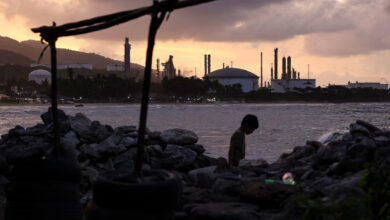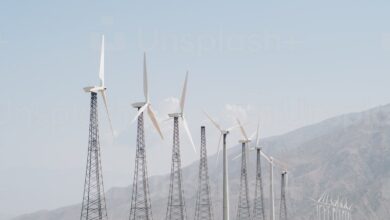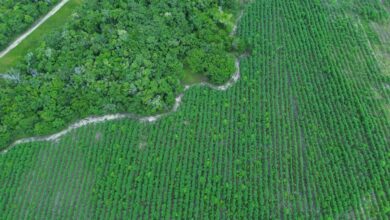
A five-kilometer-long oil spill was discovered near Edfu, a town north of Aswan, in October. Aside from the usual environmental damage from oil spills — destroyed ecosystems and destruction of wildlife — the oil continued to drift north, reaching crucial water purification facilities and destroying farmland, robbing thousands of access to drinkable water.
But despite strident calls for the Environment Ministry and Aswan Governor Mohamed Mostafa to look into the spill, residents and environmental activists say no real investigation took place.
Ahmed Zaky, an environmental activist and Aswan resident, says authorities made announcements to the press and then bought in equipment to dilute or clean the spill and “calm residents down.”
“[But] there was no investigation whatsoever,” he says.
Mostafa has said the remaining oil shrunk to an area five meters long, as state news agency MENA reported. The Environment Ministry added that the oil spill investigation had closed after the area was cleaned up and the problem solved. It attributed the spill to an accidental leak from a nearby sugar factory.
Not everyone, however, is convinced that the case is closed, as many residents’ land remains covered in oil and fish farms remain destroyed. The Habi Center for Environmental Rights filed a legal complaint, seeking to hold Mostafa and the Irrigation and Water Resources, Health and Environment Ministries accountable for the damage.
Mohamed Nagi, director of the center, says the country’s ministries are “useless” and “act as cover-up teams when it comes to environmental issues,” acknowledging the complaint may hold little weight.
“We are making it our responsibility to bring awareness to this serious issue, and doing their jobs for them,” Nagi says.
Some like Ahmed Mohee from Kafr al-Sheikh Governorate fear the oil spill was worse than originally thought.
Reports began to emerge last week that large quantities of oil had been discovered in agricultural canals and lakes throughout Kafr al-Sheikh, hundreds of kilometers north of Aswan.
Mohee says he followed the news of the spill in local media, which was also covered by environmental organizations, as it slid further north toward Cairo.
“When it began to reach Giza at the end of last year, the media went silent about it,” Mohee says. “Now, weeks later, reports are emerging of oil throughout Kafr al-Sheikh, north of Giza and Cairo.”
Mohee shares footage of the spills, which he says is now destroying more agricultural land and could pollute drinking water. He believes the government has actively moved to keep large cities, where protests or media organizations are based, in the dark concerning the extent of the oil spill.
It remains unclear whether the upstream Edfu oil spill and the downstream Kafr al-Sheikh spill several weeks later are related. But Nagi says the larger point is that these spills happen often and have continued for years.
“There are spills occurring weekly, if not daily, for hundreds of reasons, ranging from sunken boats to [people] purposefully dumping oil because a boat got stuck at a barge or a shallow part of the Nile and had to dump weight, to irresponsible industrial companies or even irresponsible oil drilling practices,” he says, adding that events like the Edfu spill can shed light on the issue.
Nagi says common oil spills less than one kilometer in length occur frequently and go unreported, which he calls “tragic and scary,” adding that if Egypt has a water contamination crisis, it would be difficult to locate the source.
A Petroleum Ministry spokesperson says the ministry is only responsible for the private companies it represents and Nile and water issues fall under the responsibility of the Health, Water Resources and Irrigation and Environment Ministries. Nagi confirms this.
Mahmoud Shawky, an Environment Ministry official responsible for impact assessment reports, says the Edfu spill is old history and anything new related to oil in the Nile, such as the reports of oil spilled in Kafr al-Sheikh, is misattributed and requires its own complaint to be filed.
However, a Health Ministry spokesperson acknowledges the Kafr al-Sheikh reports and says the ministry will do all it can to ensure that residents have access to clean water.
Mohee, meanwhile, expresses fear for his fellow residents.
“There are so many fish farms here and they’re just completely destroyed now,” he says.
Nagi says he inquired about the issue with Kafr al-Sheikh officials and they say it is likely the fault of a fisherman.
“Why would a fisherman dump tons of oil into his own fish farms?” Nagi asks.
Some think the government is trying to cover up the situation, but Ahmed Droubi, a Greenpeace Arab World representative who worked closely with the Red Sea oil spill cleanup in 2010, thinks it is not entirely malicious or calculated.
“Sure, there will be instances of corruption and cover-up between these incidents, but for the most part, I believe it just boils down to a complete lack of maintenance, safety procedures, resources and/or accountability,” says Droubi.
He adds that most residents and oil boat drivers are also generally unaware of the severity of oil spills beyond the direct observable consequences.
“That said, these instances must not be treated lightly and responsible institutions must continue to be pressured in order to hopefully establish preventive measures and build awareness,” says Droubi. “This is not an issue threatening people out of sight. It threatens any Egyptian that lives off of the Nile — in other words, everybody.”




